I think most people in marketing aim to become thought leaders one day. You show that you know your stuff and can teach and inspire others. But that kind of status comes with experience, hard work, and a genuine desire to grow.
You need to share your knowledge consistently, prove you’re an expert (not just claim it), and earn your audience’s trust. Once you’re there, though, it opens up new doors — more leads, more opportunities, and more influence in your industry.
It’s not a shortcut, but when you do it right, the payoff is huge.
Download Now: Free Content Marketing Planning Kit
Spoiler: Building my thought leadership in content writing led to all my contracts coming from LinkedIn. For Lemlist, a cold email automation tool, it resulted in $10M ARR bootstrapped. (More on this later.)
Below, let's review what thought leadership is and how to use it in your marketing strategy. I’ll also explore the best examples and types of content you can consider creating.
Table of Contents
What is thought leadership?
Thought leadership is a tactic content marketers use to build credibility for themselves or leaders in their company. The main goal of thought leadership is to become recognized as an expert and used as a go-to resource in your field. To become a thought leader, one might create and promote educational, helpful content and become active in the industry community, particularly on social sites.
A person or company might use thought leadership as a content marketing strategy because providing value to your audience demonstrates your brand‘s helpfulness. Then, down the road, when someone is seeking a product or service like the one you provide, they’ll turn to you first.
For instance, Brian Dean is a thought leader in the SEO space. By regularly posting content related to his expertise, he's proven his value as a content marketer worth following. More on him later.
But first, how do you incorporate thought leadership into your marketing strategy? Here are five simple but fundamental steps.

Content Marketing Planning Templates
Plan your content strategically with these handy templates.
- Editorial Calendar Template
- Buyer Persona Templates
- SWOT Analysis Templates
- SMART Goal Template
Download Free
All fields are required.

Thought Leadership Strategy in 5 Steps
Before you jump into devising the strategy, think first of your big, big goal.
Why do you aspire to become a thought leader? Do you want it for yourself, or is it a company’s way to build brand awareness? How will you benefit?
This work requires loads of time — be sure you’re motivated enough to embark on this journey.
Step 1: Set SMART goals.
Break up your big goal into smaller chunks and use the SMART methodology to set specific, measurable, attainable, relevant, and timely goals.
For example, you want to attract five leads from this endeavor in three months. (I assure you, it’s possible.)
Then, write down the steps you’ll need to take to accomplish this goal.
For example, you could set up a blog, grow a following on LinkedIn, write guest posts, write a round-up, etc. Prioritize them based on your target audience's content consumption behavioral patterns, which leads us to the next step.
Step 2: Brainstorm content ideas.
Think about your personas. Is your content focused and strategic to what they want to read or watch? What are they searching for and asking on social media or Reddit? Answer these questions during your brainstorming session.
Step 3: Analyze competitors.
To kickstart more brainstorming ideas, answer questions like, “Who is my audience currently going to for answers?” Again, you‘ll want to fill in the gaps in their content and talk about what they aren’t.
Also, take notes on your competitors' best-performing content. Indicators can be likes, comments, reposts, or external links to the post.
Step 4: Create and distribute content.
Once you've decided what content to create, make sure you have a point of view and personality. Your content should be easy to consume and easy to share.
Don’t regurgitate top-performing content. For a newly backed thought leader, it’s important to stand out to be noticed and picked up by social media algorithms.
Step 5: Measure results.
Track your results in order to see if your thought leadership content has been effective. Use your SMART goals to determine what metrics you're tracking.
Thought Leadership Examples
- Tim Soulo
- Aleyda Solis
- Kevin Indig
- Oprah Winfrey
- Dave Ramsey
- Seth Godin
- Marie Forleo
- Brian Dean
- Sallie L. Krawcheck
1. Tim Soulo
Tim Soulo is the chief marketing officer and product advisor at Ahrefs, with over 12 years of expertise in SEO and marketing.
I’ve been following him for more than five years now, and I can honestly say he’s earned his place as one of the top influencers in our industry.
Soulo’s insights are always backed by data, and he focuses on practical strategies that actually work — not just theory.
He’s been featured in major outlets like Inc., TechCrunch, and VentureBeat, and has spoken at top conferences like PubCon in Las Vegas, BrightonSEO in the UK, and the Digital Marketers Australia Conference in Melbourne.
If you’ve ever seen him speak or read his work, you’ll know he’s not just another voice in the crowd.

When reading his content on LinkedIn you’ll often find actionable strategies that have helped Ahrefs grow and work for other brands he’s partnered with.
That’s what I admire most about every great leader — when they share tested and tried things, not abstract ideas.
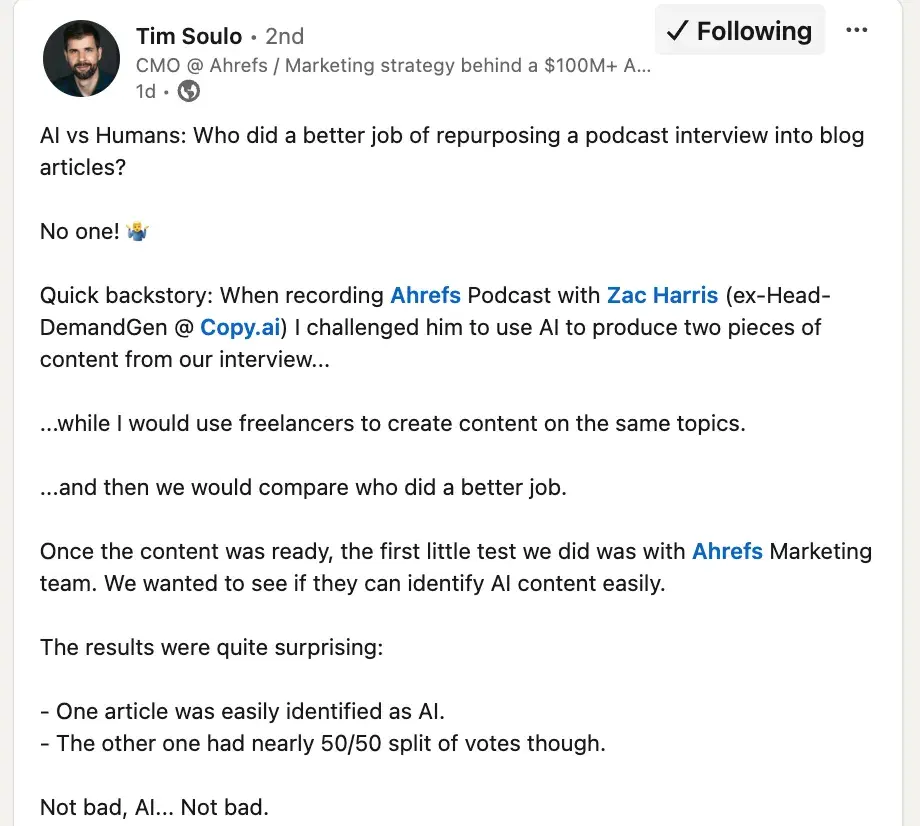
Another quality of a good thought leader is that even when dealing with complex topics like SEO or link building, they know how to make them funny, easy to understand and apply.
And that’s exactly how Soulo works – he breaks down tough concepts into golden nuggets and straightforward tips.
2. Aleyda Solís
I don‘t think there’s anyone in SEO who hasn't heard of Aleyda Solís. She is one of the most decorated SEO speakers. And for good reason.
Solís is an international SEO consultant and the founder of Orainti, a boutique SEO consultancy. She's worked with companies of all sizes, from startups to huge multinationals, helping them grow their organic search presence with the right strategies.
She was named European Search Personality of the 2018 Year and has been featured on major lists like Forbes' Top 10 Online Marketing Experts to Follow and HubSpot’s list of Female Marketing and Growth Experts.
On top of that, she's spoken at over 100 conferences, including huge ones like INBOUND, MozCon, and SearchLove.

Solís also runs SEOFOMO, a newsletter with over 35,000 subscribers, where she shares the latest SEO news, tips, and even job opportunities.
She’s the author of SEO. Las Claves Esenciales and has contributed to well-known sites like Search Engine Land and Moz.
What stands out even more than Solís’ experience is her passion. You can feel her love for sharing her knowledge with others — not only at different events but also through social media posts.
Solís isn’t just an expert — she’s all in, and that energy comes through in everything she does.
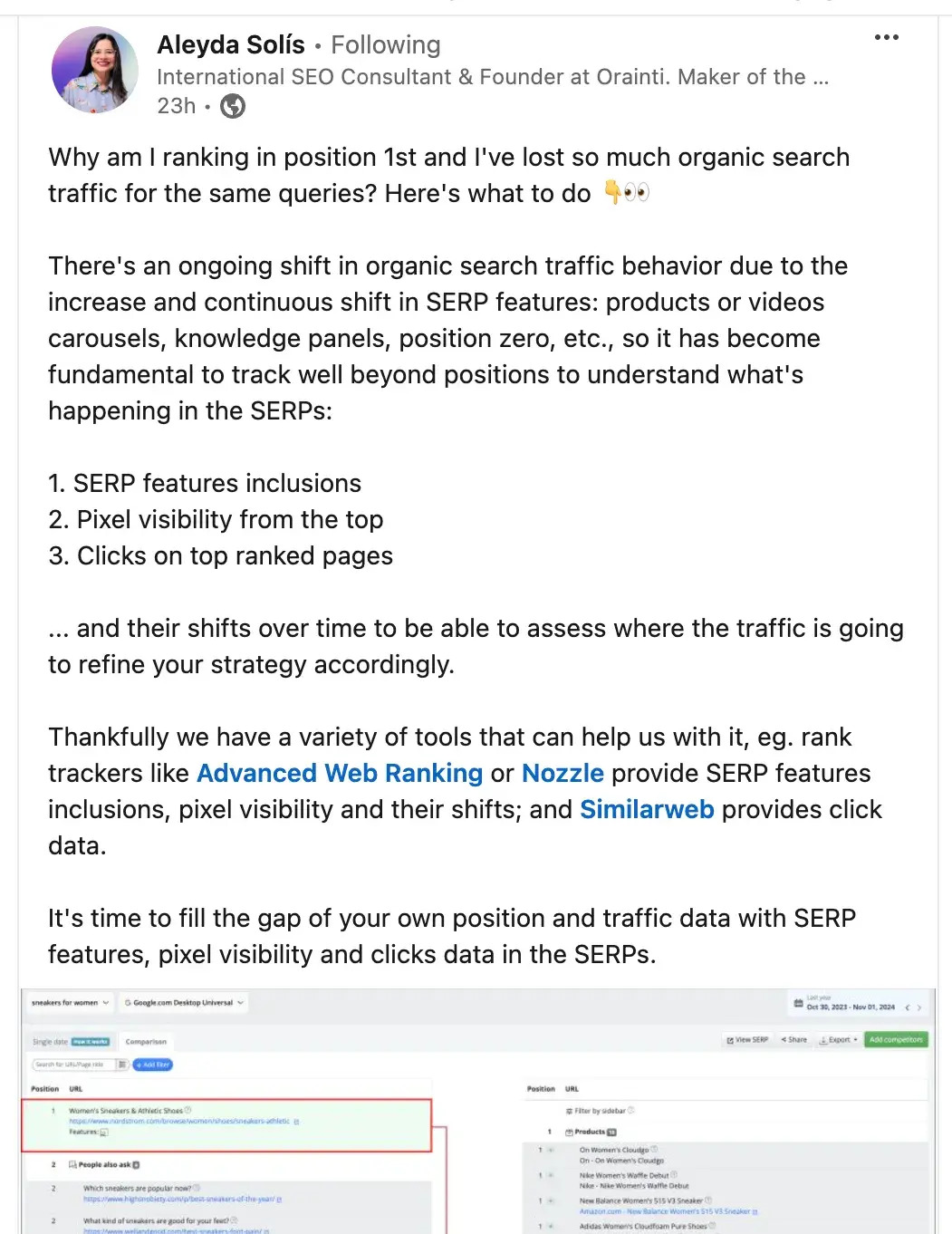
3. Kevin Indig
Kevin Indig is a growth advisor who has helped some of the world’s fastest-growing startups, including Ramp, Bounce, Nextdoor, Snapchat, and Riverside, since mid-2022.
Moreover, with experience leading growth teams at companies like Shopify, Atlassian, and G2, he’s known for scaling businesses quickly and, most importantly — effectively.
Indig also writes The Growth Memo, a free weekly newsletter with over 14,900 subscribers. It’s packed with insights on organic growth, SEO, conversion rate optimization, and product-led growth.
Big names like Adobe, Amazon, Spotify, and Klarna read it, proving Indig’s solid reputation in the industry.
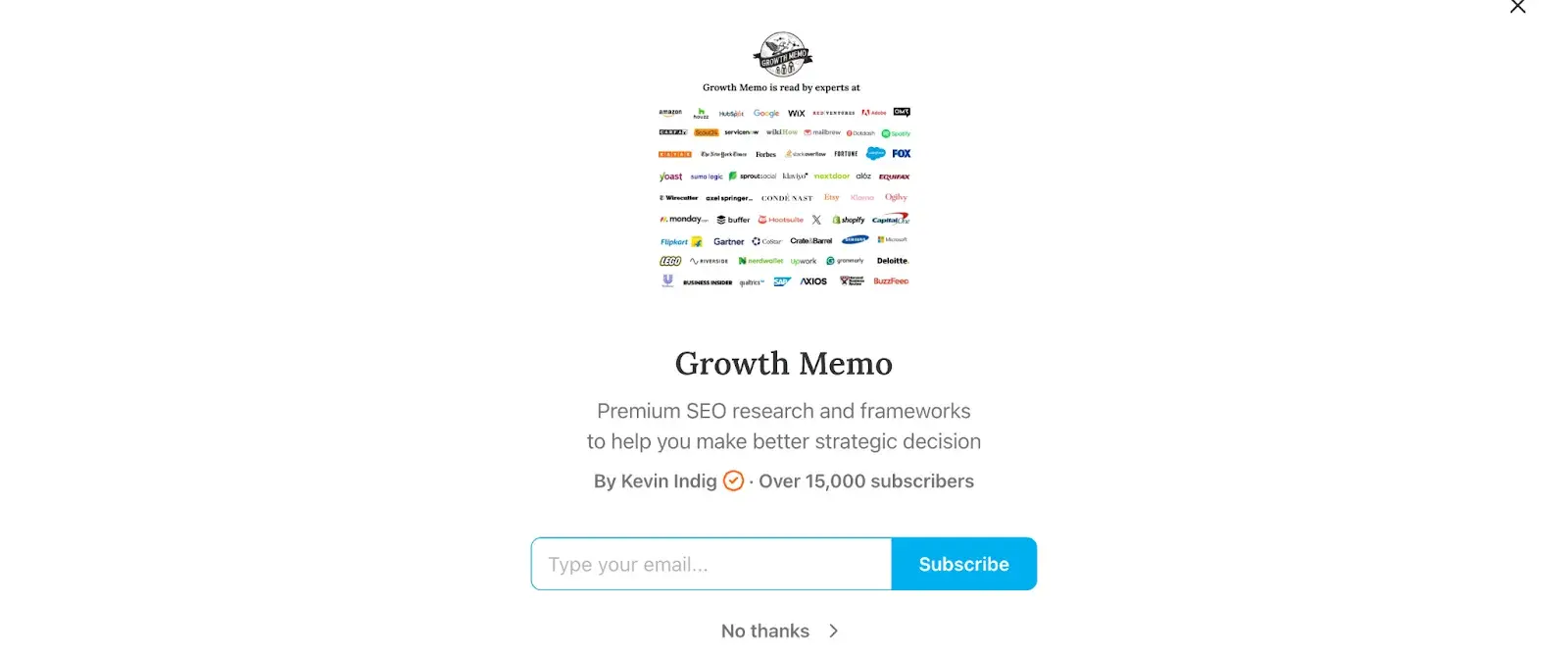
His blog posts and LinkedIn updates are always full of juicy details and stats that back up his strategies, giving readers valuable, data-driven insights.
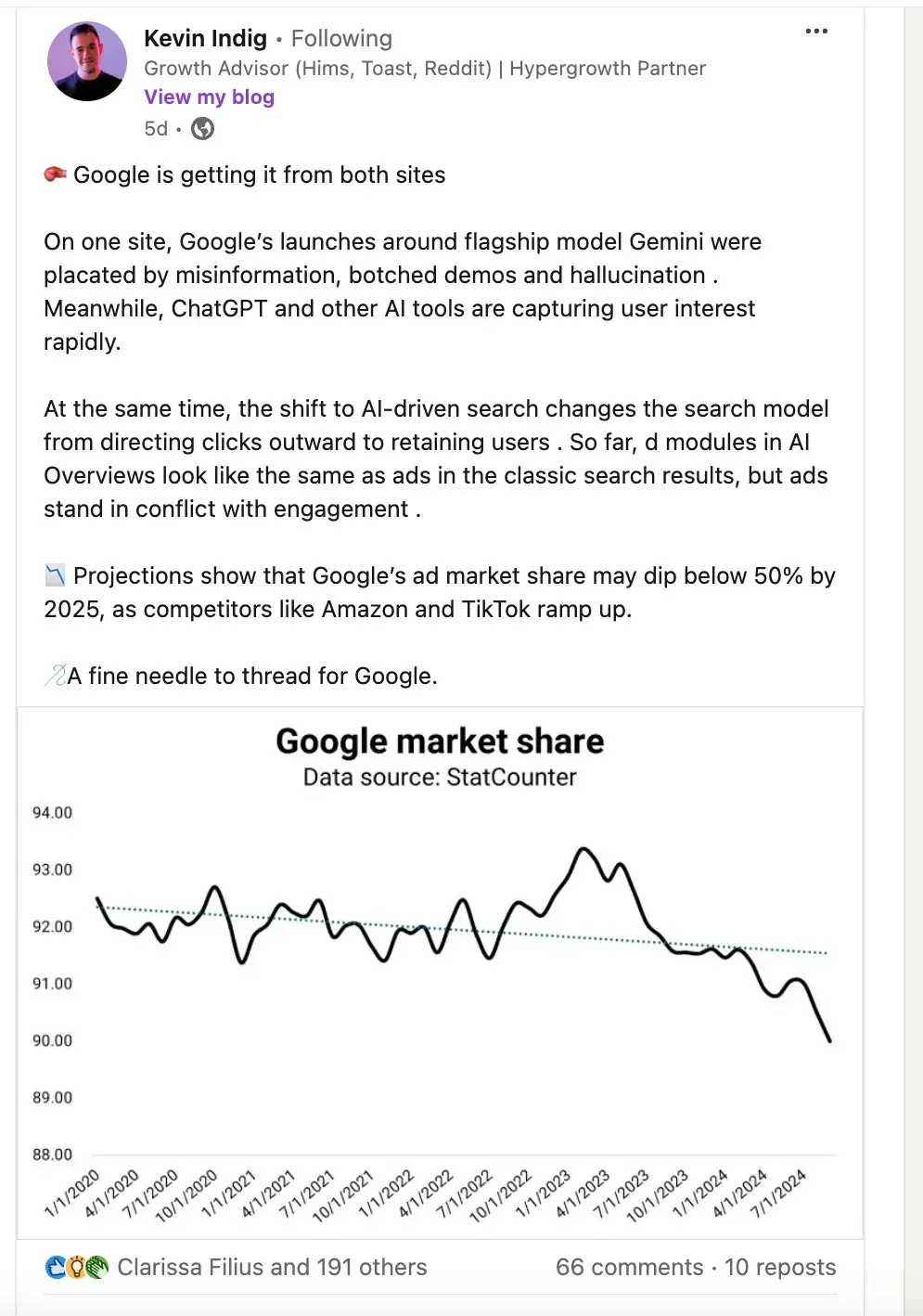
In addition to writing, Indig co-hosts the Contrarian Marketing podcast with Eli Schwartz and speaks at global events.
He’s constantly shaping the conversation around growth and marketing, positioning himself as a thought leader in the space.
4. Oprah Winfrey
Oprah Winfrey, former talk show host and media mogul, spoke at the USC Annenberg School for Communication and Journalism commencement ceremony in 2018.
Oprah Winfrey 2018 Commencement Speech: USC Annenberg
She took some of her time to speak on the role of journalists today.
She said, “You will become the new editorial gatekeepers, an ambitious army of truth-seekers who will arm yourselves with the intelligence, with the insight, and with the facts necessary to strike down deceit. You're in a position to keep all of those who now disparage real news — you all are the ones who are going to keep those people in check.”
Throughout the years, Oprah has earned her title as a media expert. Her advice and opinions on the industry are considered thought leadership because of her expertise, which she spent her career cultivating.

Content Marketing Planning Templates
Plan your content strategically with these handy templates.
- Editorial Calendar Template
- Buyer Persona Templates
- SWOT Analysis Templates
- SMART Goal Template
Download Free
All fields are required.

5. Dave Ramsey
Dave Ramsey is a personal finance expert. He has a degree in finance and real estate and is known for counseling people on paying off their debts.
Ramsey became a thought leader when he continued to produce content in the industry, including hosting a radio show, writing books, and podcasting.
One of the best examples of his thought leadership content is his podcast, the Ramsey Show. He posts episodes almost every day on topics such as personal finance, leadership, and career growth."
You can also follow his X, where he shares bite-size financial tips and advice.
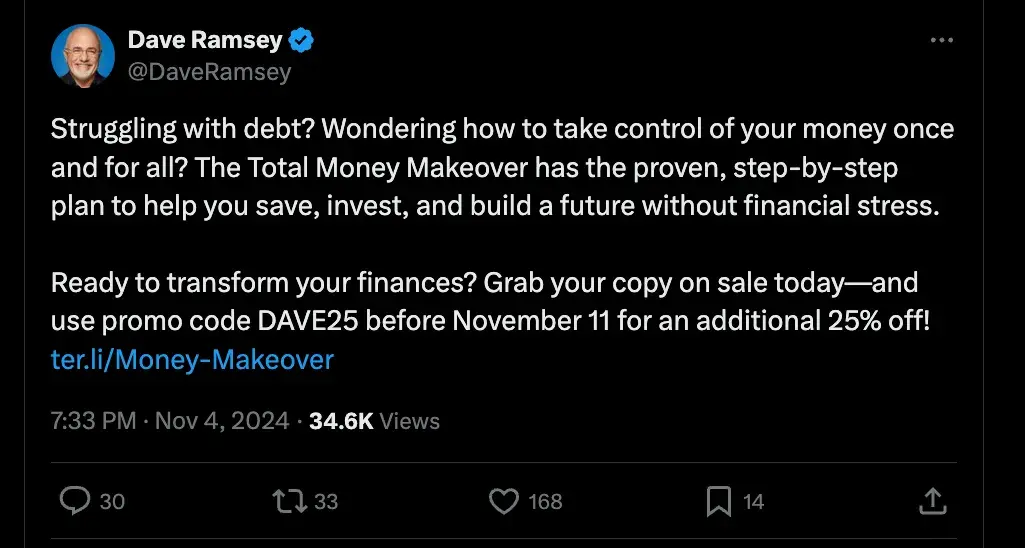
6. Seth Godin
Seth Godin is an entrepreneur turned business mogul.
He‘s written books addressing marketing, advertising, and leadership. He’s also in the Marketing Hall of Fame, launched by the American Marketing Association of New York.
He became a thought leader because of the successful content he delivers, including speaking engagements, books, and his blog.
Let's do a deep dive into his blog. Here, he regularly writes about his areas of expertise, including marketing and business. For instance, in this blog post, he writes about the difference between reassurance and encouragement.
He says, “Reassurance always runs out. Reassurance implies that the only reason to go forward is because it’s certain to work. Encouragement means that someone sees us, understands us, and believes in us. Even (especially) when things don’t turn out as we hoped.”
7. Marie Forleo
Marie Forleo is a life coach, speaker, author, and host of her own YouTube channel.
She is known for creating and selling online courses, especially in regard to entrepreneurship. She became a thought leader because of her expertise in business coaching.
One example of thought leadership content she's produced is this video on her YouTube channel:
Here, she speaks on her expertise in content by discussing how to find fresh content ideas every week. She delivers three strategies her viewers can use to generate content ideas for their blog, podcast, or videos.
8. Brian Dean
Brian Dean is an SEO expert. After he created a successful online business, he decided to create a blog – Backlinko — that chronicled the lessons he learned along the way.
Essentially, he created a thought leadership site meant to boost his credibility.
He uses long-form content that is educational and valuable to his audience, such as How to Get High Quality Backlinks (7 Top Strategies).
He also shares articles and comments on SEO trends on social media, but lately, he’s been leaning more into video content. This shows that Brian is staying on top of the trends and just wants to give his audience the best.
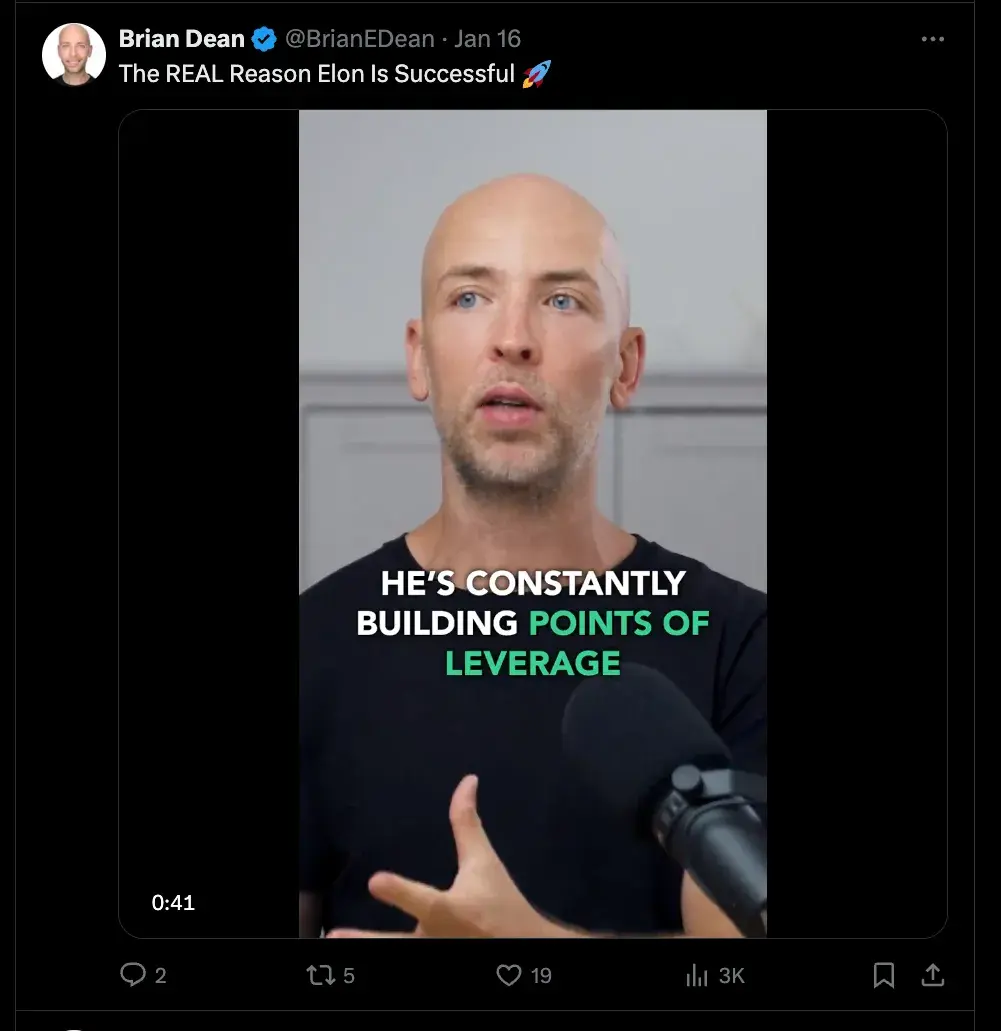
9. Sallie L. Krawcheck
Sallie L. Krawcheck, CEO and co-founder of Ellevest, a digital advisor for women, is an expert in finance. Before she started her company, she was the president of Global Wealth and Investment Management at Bank of America.
Throughout her career, she's become a thought leader because she is widely published both on social media and traditional media such as television shows.
One example of thought leadership content she's created is on LinkedIn. Here, Krawcheck proves her expertise in finance by publishing articles and organic posts about finance. This boosts her company's value and brand awareness.
6 Thought Leadership Best Practices
Thought leadership marketing is a strategy where content marketers share valuable insights on topics that matter to their audience.
The goal is to position the company or its leaders as trusted experts, building credibility and trust that ultimately helps the business grow.
Now, let’s go over some best practices to help you get started.
1. Know your audience and continue learning about them.
Knowing your audience is the key to succeeding with any marketing strategy, and thought leadership is no different.
You’ve got to understand what inspires your audience. What they preach and rave about. What are their pain points? What questions are they asking? Draft your buyer persona.
Once you know these things, you can begin answering their questions with thought leadership content. Neil Patel shared great advice on understanding your audience better:
“Check the comments on your social media posts (or posts by your competition) for focus points. Look for recurring questions that can be turned into helpful tutorials. Are multiple people experiencing similar issues? Your next marketing thought leadership article could help.”
Pro tip: Continuously check in and reevaluate your buyer personas. Are your customer's questions changing over time? Do their pain points look the same today as they did when you first began as a company?
People evolve, and so will your audience.
2. Be active on social media.
Social media is an effective vehicle to build your brand and authority.
First, social media keeps you active and engaged with your community. Second, you can use it to comment on industry news and ensure your brand voice is heard in conversations regarding relevant industry trends.
Plus, you can use social media to promote thought leadership content in an organic way without seeming too promotional.
As Geri Stengel, founder and president of Ventureneer, explained: She has attracted clients through her thought leadership on women entrepreneurs and entrepreneurial funding.
In many cases, clients didn’t even need to check references because they already knew what she stood for.
3. Publish a variety of content in a variety of places.
Creating thought leadership content doesn‘t just mean posting on your blog.
I mean, for sure, you’ll still want to post it, especially since 91.4% of organizations involved in thought leadership are creating articles.
But it also involves being active on social media, guest posting on other sites, and speaking at events or on podcasts.
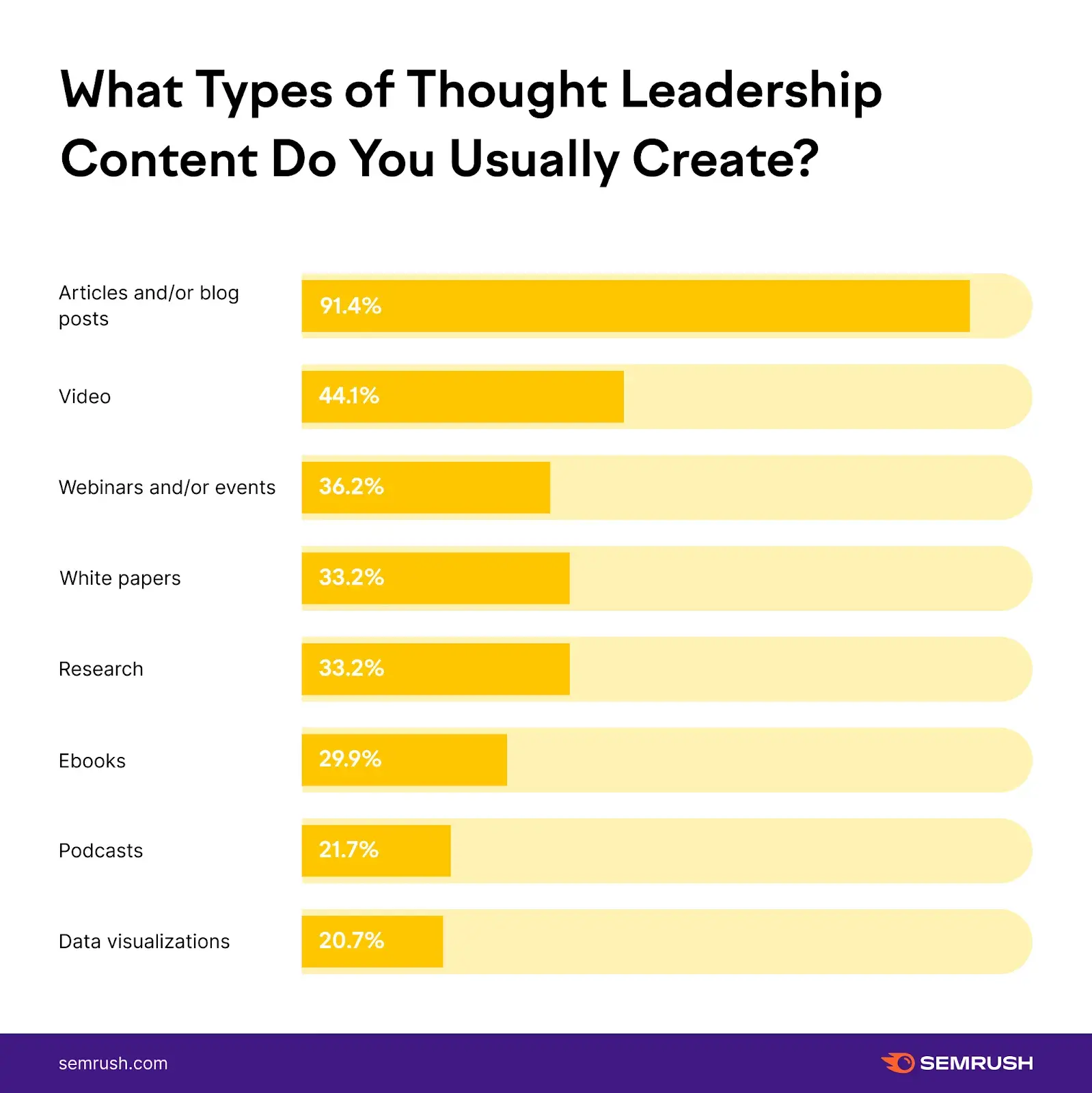
It's important to mix it up with owned media versus other media sources. Consider having a combination of written, video, and audio content, like podcasts.
Ultimately, thought leadership content should show up wherever your audience is.
4. Analyze what your competitors are doing.
If your competitors are creating thought leadership content, analyze what they‘re doing. How often are they posting? Where are they posting? Don’t be afraid to get inspiration from your competitors.
LinkedIn has always been my favorite social media platform for this purpose.
When I was in charge of the PR department in Serpstat and its expansion to foreign markets, I analyzed every inch of the competitor's presence in those markets (French and Spanish) and how they established thought leadership there.
What did I get out of it? A ton of insights into different strategies, which let me engage 3-5 influencers and post six guest posts from the first month of work on each market.
5. Create valuable content.
75% of decision-makers, including C-suite execs, say thought leadership content has made them look into products or services they hadn’t thought about before. This shows how powerful content can be in sparking new interest.
For instance, it can be tricky to prove yourself an expert in marketing as a whole (at least in the beginning), but you can have the director of SEO at your company create content for your blog or LinkedIn to demonstrate your brand's specific expertise in SEO.
But for a solo creator, you can share your journey in what you do. That’s enough.
You always have the audience to tap into with your knowledge and voice — even if it seems insignificant at first.

Content Marketing Planning Templates
Plan your content strategically with these handy templates.
- Editorial Calendar Template
- Buyer Persona Templates
- SWOT Analysis Templates
- SMART Goal Template
Download Free
All fields are required.

6. Be genuine.
I can‘t say it enough, but being too promotional doesn’t connect with your audience. In fact, it'll probably annoy them.
You should produce content that is genuine and authentic. That conveys your voice and beliefs. And don’t fret about doing so.
Look how Sabeeka Ashraf makes snappy posts and attracts hundreds of likes, comments, and leads.
On the other hand, you want to make sure your content makes sense to everyone, offers perspective, and is supported by market-backed research that will help inform your audience's opinions or decisions.
Using examples, facts, and quotes will go a long way.
Now, I’ll show your powerful types of content for thought leadership and what results they yield for creators and companies alike.
Thought Leadership Content
Thought leadership content comes in all shapes and sizes — media contributions, talks at events, webinars, blogs, podcasts, guest posts, ebooks, videos, and social media. It’s a long game, so creating and sharing this kind of content takes time and consistency.
So, how do you come up with content ideas to talk or write about?
Considering that 47% of respondents from Brightail Research engage with 3-5 pieces of content before speaking to a salesperson, it’s clear these pieces need to be high-quality.
Or as Richard Tiland from New Evolution Video says: “Content needs to be new, fresh, original, disruptive, educational, and thought-provoking.”
You'll also want to keep in mind industry news. Is there anything pressing going on? Are there any issues being discussed in your field? If so, address those and forecast the future of your industry.
Additionally, you can‘t go wrong with articles using formats like tips, how-tos, or best practices. Just ensure you’re producing long-form, educational content that your audience wants to read.
Books
Books are some of the best tools for thought leadership. They’re like a direct line to someone’s brain, where they lay out their ideas, strategies, and lessons. Can you imagine becoming a published or selling author?
Books give you insane credibility. They show you’re serious about your expertise.
One of the best reads for a bootstrapped company that bet on thought leadership marketing? The $150M Secret.
I loved every single page and highly recommend it. Guillaume Moubeche, the founder of lemlist, shows how he turned $1,000 into $150 million in just 3.5 years with practical, no-fluff advice.

Social Media
Social media is where conversations happen.
It gives you a platform to share insights, start discussions, and connect directly with your audience. You can show off your expertise while staying approachable.
Plus, social media has a massive reach. A single post can spark a conversation that connects you with industry peers, potential clients, or even future collaborators.
Let me refer to lemlist again. Their team turned LinkedIn into a thought leadership machine. The whole team gets in on the action, posting sharp, juicy content on topics like sales tips, growth hacks, and startup advice.
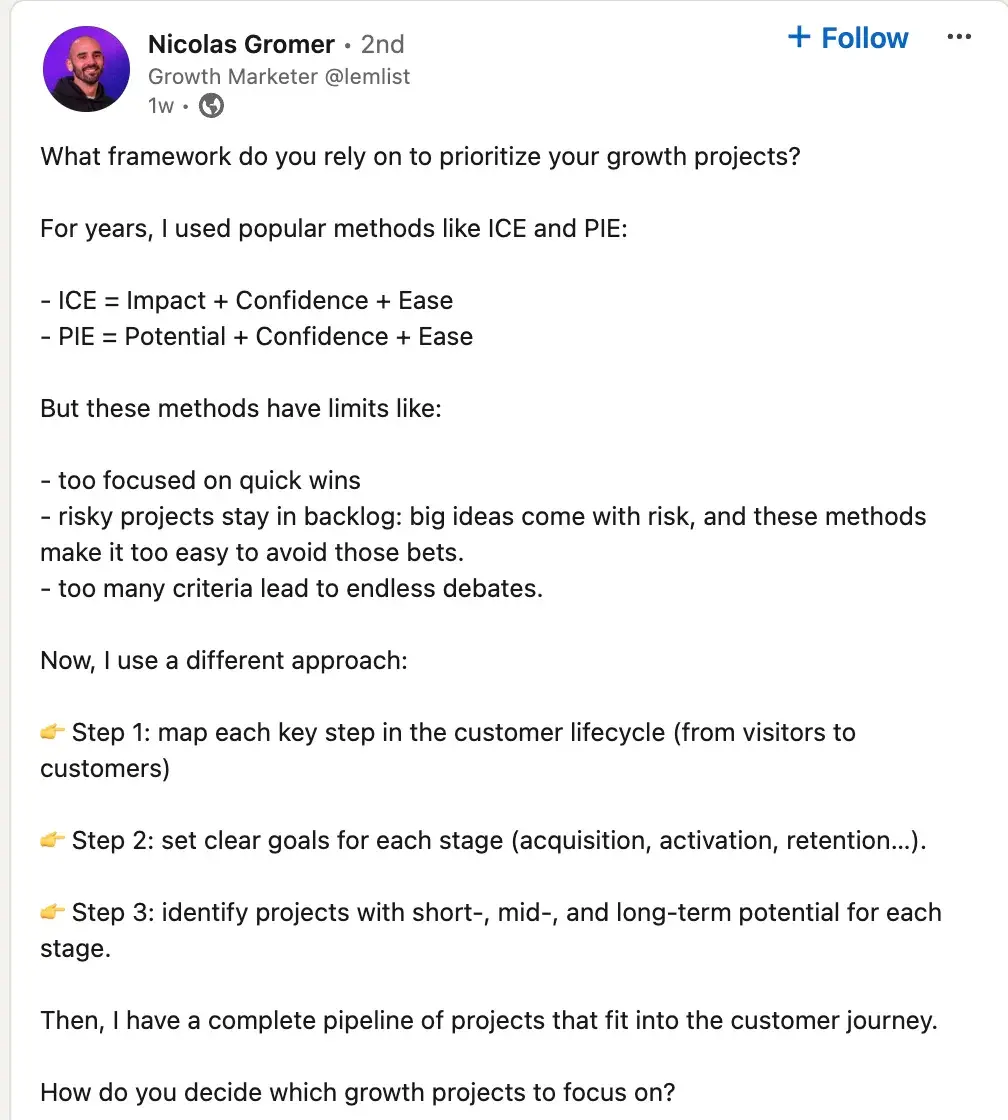
Everyone plays their part, which means more valuable insights hitting a bigger audience. Posts are simple but effective — start with a question, drop actionable tips, and tag big names for that extra boost.
They’ve also nailed co-marketing with live interviews featuring legends like Aaron Ross and Jill Rowley.
Overall, it’s a genius way to grow their network, build credibility, and keep lemlist front and center in the sales game.
Community
When a brand engages with its audience — not just pushing products but having actual conversations — it turns customers into supporters. People want to feel like they’re part of something, not just being sold to.
So when a brand listens and responds, it becomes a leader, not just a seller.
An example that comes to my mind here is the lemlist family. Again. Because these guys built a $150M company relying heavily on different types of thought leadership marketing.
Community building was among those that supercharged lemlist’s growth from $0 to $250K ARR in a year and hit $4M ARR in three years — all bootstrapped.
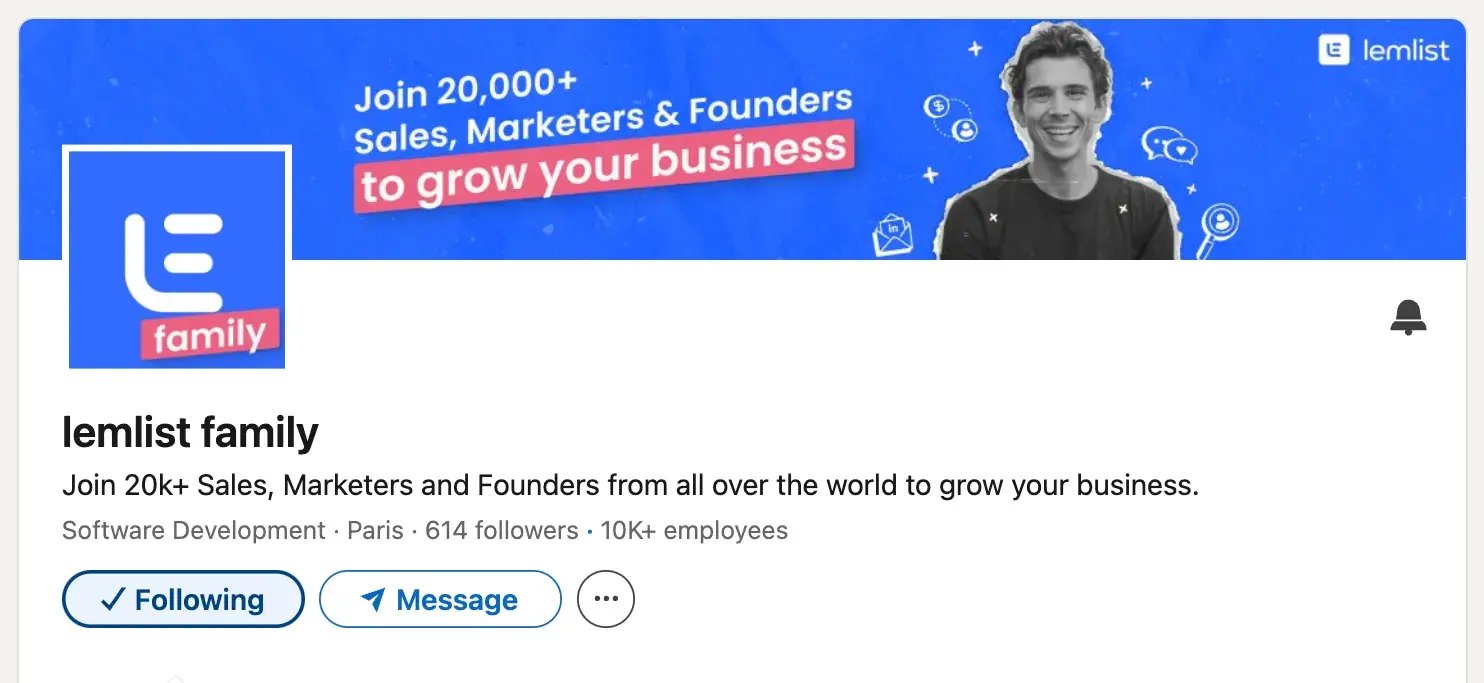
Events
Events are huge for thought leadership because they bring people together to learn and share real insights.
Something I like most about it is that all the content — talks, panels, convos — can be repurposed to keep your voice out there long after the event wraps. Take Semrush’s Global Marketing Day as an example.
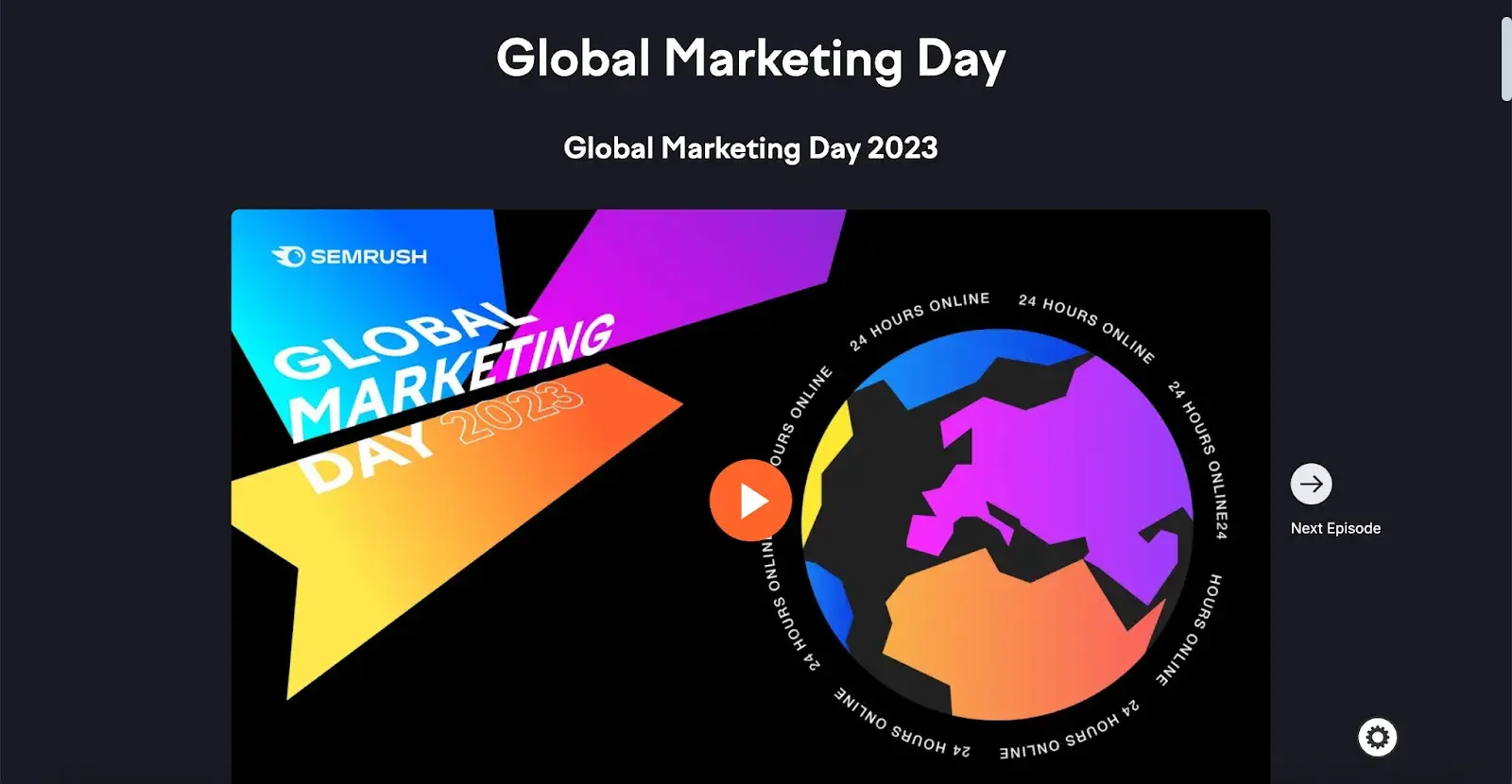
It’s a 24-hour online marketing conference, the first of its kind in this format, where experts from all over the world drop knowledge.
Olga Andrienko, VP of brand marketing at Semrush, who pushed this idea, shows how leaders can use events to build thought leadership.
The results will blow your mind:
- Over 5,000,000 people were reached from all posts.
- 2,700 tweets with the hashtag #globalmarketingday.
- 90,000 registered for the event.
- 55,000+ leads.
Podcasts
Podcasts are everywhere these days — pretty much everyone’s tuning in.
A lot of people, myself included, prefer podcasts over music while running, walking, or even driving. So, it’s a perfect way to get your brand out there.
No matter your niche, you can create a podcast about anything. Host your own or have someone join you for a Q&A-style podcast.
Take Dr. Alexandra Solomon. She’s a relationship expert absolutely crushing it with the Reimagining Love podcast. She covers everything from love to personal growth, earning her status as a trusted voice in mental health.

Most people connect with her way more this way than just reading her articles. It feels personal — like she’s talking directly to them.
Webinars
Webinars break down complicated topics, and get shared across platforms, which helps you reach more people and show off what you know. Just like podcasts, webinars can cover all sorts of topics.
While we're used to seeing webinars focused on B2B and marketing themes, they can really be about anything. A great example is The Goddard School, which runs webinars on parenting and child development.
They offer valuable tips and advice to parents, showing how webinars can be super effective in educational and non-commercial spaces, too.

Videos
Videos add a personal touch that text just can’t match and immediately make your ideas more relatable and engaging.
The juiciest thing? Platforms like TikTok make it easy to reach a wide audience fast (literally overnight if it goes viral). The short, punchy format grabs attention and keeps people interested.
Influencers and industry experts know how much benefit it can bring.
A notable example is Mirta Miler. Yeah, when you see her TikTok with 18 million followers, it feels huge, like she's a U.S. celebrity. But the truth is, Mirta is a makeup artist living in Croatia.

I remember when she had just 2K followers a few years ago and was just an everyday girl who loved makeup. By consistently posting amazing makeup content and tutorials, she became a TikTok makeup star.
Now, people from all over the world recognize her work, and she’s constantly collaborating with the biggest brands out there.
Contributions
When you share your insights in top-tier outlets like Forbes, The New York Times, HubSpot, or Harvard Business Review, you‘re not just getting attention — you’re earning trust.
Big media companies already have large, engaged audiences, and your contribution gives you direct access to those people. It also helps you make your voice more influential and recognized.
To get quoted in top outlets, build your brand, pitch relevant ideas, and offer your expertise on platforms like Featured or HB2BW. You can also network with journalists and provide unique insights directly into their inboxes.
Interviews with other SMEs
Interviews with SMEs are a goldmine for thought leadership. You leverage your interviewees as if you're signaling to the world, “Hey, I’m talking to this person, so my content is trustworthy!”
Solo interviews let you dive deep into an expert’s mind, while roundups bring in a mix of perspectives. A perfect example is Ben Goodey from “How the F*ck” SEO series, where he interviews marketing leaders.

Ben had used these interviews to leverage others' success and built his own profile at the same time. A killer strategy, actually. The audience is also greedy for such content since it’s packed with practical value.
Turn expertise into influence.
Thought leadership is a great strategy that every content marketer should be thinking about.
Why? Because it allows you to prove expertise in your industry while simultaneously expanding your reach and helping your readers and customers grow.
What I love most about it is that it’s a two-way street. When I share my knowledge, I get to hear from my audience, learn from them, and see what resonates.
It’s an ongoing cycle of learning and adapting.
Your goal is that when people talk about something in your area of expertise, they say, “I’m going to check out XY’s blog/tutorial/webinar; I’m sure I’ll find something useful there.” That’s when you know you’ve made it.
The title of “thought leadership expert” is something others will give you – you can never give it to yourself.
Editor's note: This post was originally published in March 2022 and has been updated for comprehensiveness.

Content Marketing Planning Templates
Plan your content strategically with these handy templates.
- Editorial Calendar Template
- Buyer Persona Templates
- SWOT Analysis Templates
- SMART Goal Template
Download Free
All fields are required.




![The Most Common Leadership Styles & How I Found Mine [Expert Insights]](https://www.hubspot.com/hubfs/leadership-styles-4.jpg)




![The Best Ways to Get Visibility from Your CMO and Other Marketing Execs Who Can Move You Forward [Data]](https://www.hubspot.com/hubfs/marketing%20manager%20trying%20to%20increase%20marketing%20executive%20visibility%20in%20their%20role.jpg)


![15+ Organizational Skills Every Leader Needs [+ Ways to Develop Them]](https://www.hubspot.com/hubfs/organizational-skills.webp)